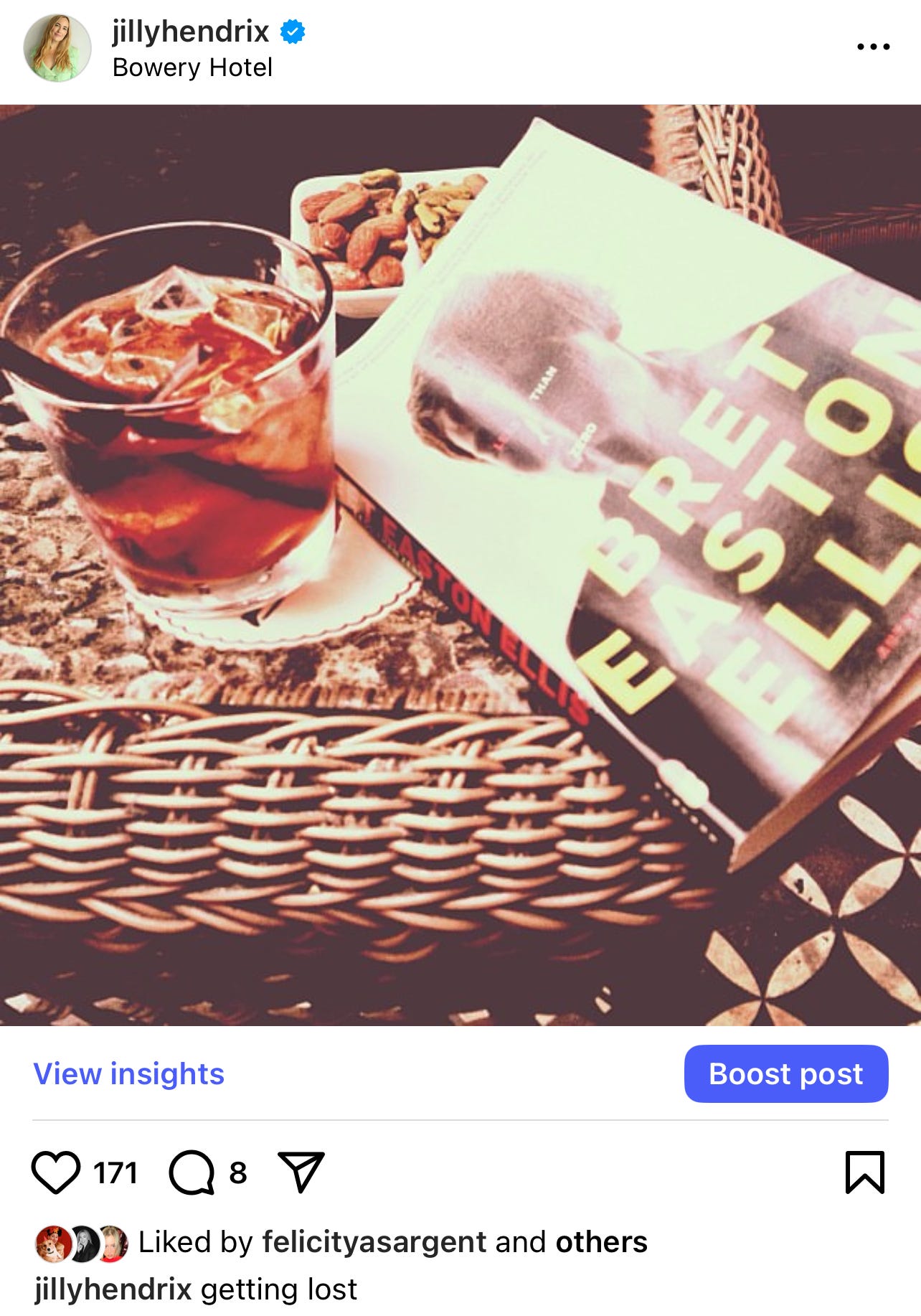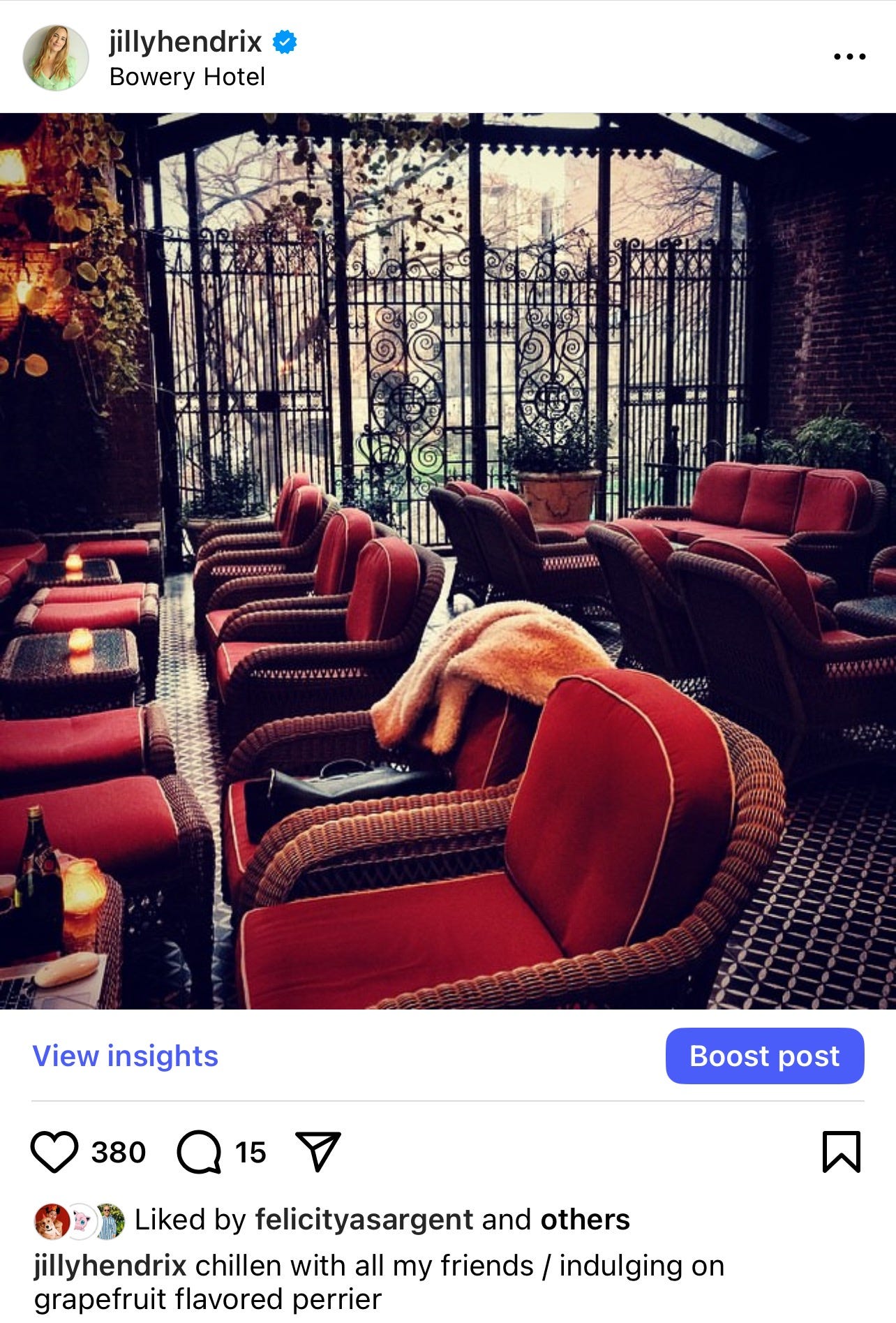Less Than Zero: The Bowery Hotel
Trigger Warning: This post discusses themes of mental health struggles that may be distressing. Please read with caution. If you or someone you know is struggling, resources are provided below.
It’s 2015 and I’m at the Bowery Hotel alone on my birthday, nursing an Old Fashioned and reading Bret Easton Ellis. Blending into its burnt-red couches, soaking up the atmosphere of successful—and not so successful— people around me, thinking about what it would be like when my big moment would arrive. It had been a few hours since I got here, tucked into the corner by the window. I was deep into Less Than Zero.
If you weren’t escaping at a club, you were holed up in places like this, where the pretension is palatable, but it’s also part of the fabric. It didn’t matter that the Bowery feels a little rundown; the walls are filled with secrets. The crowd around me shifts—laughter piercing the hum of indifferent conversations. An actor I half recognize from a past episode of Master of None walks in. The usual mix of New York’s too-cool elite—circling each other like a game of who-knows-who. People paying $25 for a drink just to be seen. A metal gate stands at the edge of the patio, weeds creeping through the cracks—almost like a scene out of Great Expectations. I’m convinced if you stare at it long enough, you might believe that the impossible—your dreams—lie just beyond that gate.
But I’m not here to join in. I’m here to observe. To remain a ghost in the room. The clink of glass. The murmur of voices. It swirls around me. I keep my head down, searching for something undefined. The hotel is my own private stage for processing everything—an attempt to capture that fleeting, elusive feeling of belonging while constantly questioning if I actually fit in.
This is where the rockstars go. Where the artists and writers gather. The humans I admire from a distance—creating, making, breaking—hoping that by proximity, I can somehow cross over to their world. It’s not enough to just be here, though. You need to belong. I charm the waitstaff, bypassing the usual rule of needing to be a celebrity or guest to linger in the lobby. They know me by name. Maybe because I’m good at this or maybe because they see me alone so often, I must be someone important. I long for that creative spark that would make me feel like I have a reason to be here, to be in New York.
I’m surrounded by stories, but can’t seem to find the words to tell mine.
I scribble notes on the hotel paper—“It’s a threesome if you count my mind.” “Been trying to find myself but keep getting lost online.” “Want to touch my anxiety?” (Notes To My Selfie).
I feel like the outcasts I always identified with. I was Holden Caulfield, railing against the phoniness. I was the aimless soul in Less Than Zero, searching for meaning in a city with none. I was the loner in The Sun Also Rises, watching lives unfold that I couldn’t grasp.
I’m almost embarrassed by how much I notice him—an artist with shaggy hair, a scruffy beard, eyes that see everything but say nothing. He stares at me like he’s trying to figure me out. For a second, I think he might be hitting on me. I like the idea—someone so good-looking thinking I’m attractive. But then he leans in and whispers, “Are you okay?”
Caught off guard, I assume he was about to refill my cocktail. He’s not asking because he cares—he’s asking because he knows.
Here’s the thing: I don’t know how to be “okay”. I don’t know if I’ll ever be “okay,” but I’m not going to say that, so I say, “Yeah, of course,” trying to sound casual.
He sees right through me, and I can see right through him, as though we both carry the same weight in silence. We exchange a few more words, and just as he’s about to leave, he says, “Let me know if you ever need a place to stay.”
That’s when the unease hits. I’ve never felt more exposed.
He was known for drawing chalk hearts around New York City, a signature that I’d encounter over the years. We never spoke again, but there was always a quiet exchange between us, a shared feeling like we both knew how to suffer. Years later, I’d hear the news that he had taken his life.
I think about that exchange often. His offer wasn’t romantic. It was a recognition, an unspoken understanding of what it’s like to feel invisible in a world that never pauses long enough to see anyone. He saw my pain before I even knew how to identify it. I wish I had the chance to return the kindness—to ask him if he was okay, if he ever needed anything, to tell him he could stay with me.
I think about my heart tattoo on my side—the one I got when I was 23. Maybe subconsciously he knew about that tattoo. Maybe he saw in me the same longing he saw in himself. Maybe we were both trying to fill the same void, fix the parts of ourselves that always seemed broken. Maybe that’s what this is—this endless search for something real, for love, for connection… something to make our heart whole.
But like him, like me, maybe none of us ever truly find it.
I finish my 3rd old fashion and realize I’ve overstayed my welcome. The world spins around me, and for a moment, I almost feel like I could be part of it. The city, the Bowery Hotel, the noise, the people—it all feels so close, yet so far.
Maybe that’s the thing about New York. It has this way of making you feel like you’re right on the cusp of something. But you can never quite get in.
If you’re struggling with your mental health below are some resources.
National Suicide Prevention Lifeline (USA): Call or text 988 for immediate support.
The Trevor Project (for LGBTQ+ individuals): Call 1-866-488-7386 or text START to 678678.
National Alliance on Mental Illness (NAMI): Call 1-800-950-6264 for free, confidential support.



